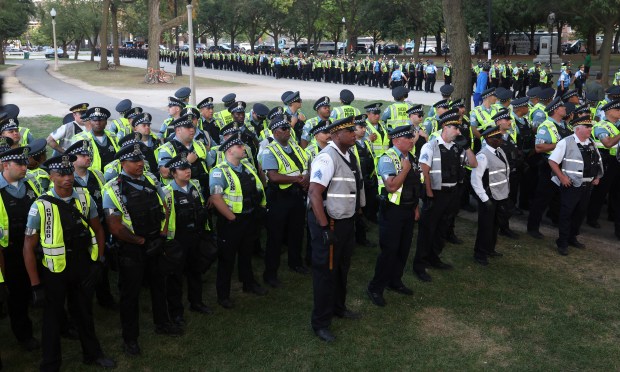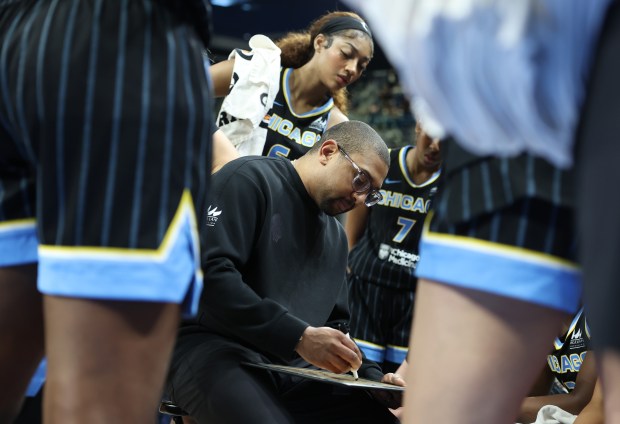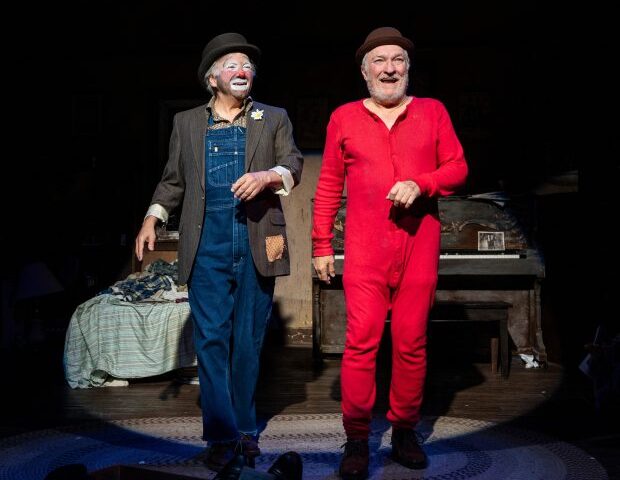A Cook County judge on Tuesday released two people from custody after they were arrested in connection with the breach of a security fence Monday afternoon near the Democratic National Convention site.
During the hearing at a North Side police area headquarters, Judge Mary Marubio ordered them to stay away from the United Center area for the rest of the convention.
A 31-year-old Chicago man was charged with a felony count of aggravated battery to a police officer. An officer was trying to re-secure the breached fence when the man threw liquid at the officer, hitting him, prosecutors alleged, then threw a crumpled plastic bottle in the officer’s direction that hit a fence.
A 35-year-old Chicago woman was also charged with a misdemeanor for resisting arrest in connection with the breach and released from custody.
The two were among a number of protesters arrested on Monday at a pro-Palestinian march that started in Union Park, but not all were brought before a judge.
Public defenders representing the protesters objected to Marubio’s order that they stay away from the DNC perimeter, arguing that they have a First Amendment right to protest there.
“Imposing that restriction would prevent him from protesting specifically the DNC,” said Assistant Public Defender Erin Monroe.
Marubio, though, in granting the order at the state’s request, said barring defendants from the place of arrest is a common pretrial condition, and that the ban doesn’t limit them from their “ability to protest or speak.”
Police and city officials were expected to appear at a morning briefing Tuesday to give a security update.
The first major protest of the DNC week Monday featured energetic speeches and chanting, but the group of several thousand pro-Palestinian demonstrators remained mostly peaceful.
A group of protesters broke the fencing after their march was over, and several were arrested. The exact number had not been released Tuesday morning.
Speakers were expected in Park 578 in the United Center area Tuesday. Other events were planned as well.
Among the first Tuesday was a nurse and healthcare researcher who delivered a speech to an empty park on a city-sponsored “speaker’s platform.” She advocated for equitable healthcare for communities of color.
The scene was a stark contrast to the previous day’s protests and heavy police presence. Only a handful of reporters were present to listen as her voice echoed through the area near the United Center, amplified by two tall industrial speakers.
“Our nation is at an inflection point,” said Athena Lerch. “The decisions we make now will determine whether we continue to be a land of more freedom, more rights and more opportunities for all. This is especially true in healthcare.”
In effort to support free expression, the city has built a stage equipped with microphones and amplifiers at Park No. 578 near the United Center, which will be open for 45-minute speaking slots during all four days of the DNC. All speakers are required to get pre-approved to speak, with the application deadline already having passed on August 10th.
About eight uniformed security officers surrounded the stage as Lerch spoke. A yellow concrete barrier separated the area further from the rest of the park.
Lerch, who is currently working on a manuscript about racial disparities in healthcare, said she had hoped that the speaker’s platform would act as a chance to communicate her work to policymakers.
She said she appreciated having the platform, but was disappointed about the absence of an audience.
“My project is focused on the South and West side communities of Chicago, and I thought this was the best place to get this message out, because here we are on the West Side,” Lerch said. “There’s not a big audience here right now, but I was hoping to inspire people to tell them, hey, your voice matters.”
On the CTA Green Line train heading toward the United Center Tuesday, neighbors Dona White and Kathy Endo from Evanston said they planned to attend a “meditation for peace” at St. Andrews Episcopal Church.
The church on Hoyne Avenue, which is located just a few blocks west of the convention center, will be holding prayer sessions every day of the DNC from noon to 4 p.m. they said. White added that others who could not make it to Chicago for the convention would be joining the prayers from afar.
White, who is 82, said that she hopes the protestors advocating for an end to the war in Gaza get their voices heard. Yet she added that the first night of convention speeches had emphasized how Kamala Harris also supports justice for the people of Gaza.
“I am just horrified by people having to live in fear of death every day,” White said. “It’s like the Vietnam war every day, pollution of ammunition and death of people. War never solved anything.”
White and Endo both lived in Chicago during the violence of the 1968 DNC, and said that they hoped that things would not escalate similarly this time around.
A coalition of organizations kicked off the week’s protests at noon Monday, chanting against the Biden administration’s support for Israeli military action in Gaza. It had been billed as the largest planned protest of the week, but drew significantly fewer marchers than the 20,000 organizers had hoped for.
After the fencing was taken down, officers moved in and formed several lines of defense, while some protesters could be seen throwing their wooden signs at the police. Other officers in riot gear came in from behind the protesters and corralled them back into nearby Park 578, using batons, to keep the situation from escalating.
The police put the broken pieces of the fence back into place, then lined up facing the wall of people.
By Tuesday, a third layer of security fencing and concrete barriers had been installed on Washington Boulevard near Park 578. Officials had erected tall fencing on the north and south edges of Washington ahead of the DNC; the third fence was installed in the middle of the street.
“At no point was the inner perimeter breached, and there was no threat to any protectees,” police said in a statement Monday evening.
Later Monday, a group of about 200 protesters attempted to set up tents in Union Park, but dismantled them after a confrontation with police.
Police used their expected tactics during the march, guiding demonstrators along the planned path. Dozens of Chicago police officers on foot — including Superintendent Larry Snelling — fanned out ahead of the marchers at the start of the roughly 1-mile route, which took the crowd to within a few blocks of the United Center before turning back east on Lake Street.
Police used helicopters to watch from overhead as demonstrators waved Palestinian flags and chanted slogans like “Palestine will be free! From the river to the sea!” — a chant seen by many as calling for the elimination of the Jewish state.
Tuesday’s largest planned protest event appears to be a march by the group Behind Enemy Lines. That demonstration also aims to confront the Biden administration’s support of Israel in its war against Hamas.
Unlike Monday’s protest, the Tuesday march will be in the evening and presumably run after dark. It is scheduled to kick off at 7 p.m. in front of the Israeli consulate on Madison Street.





